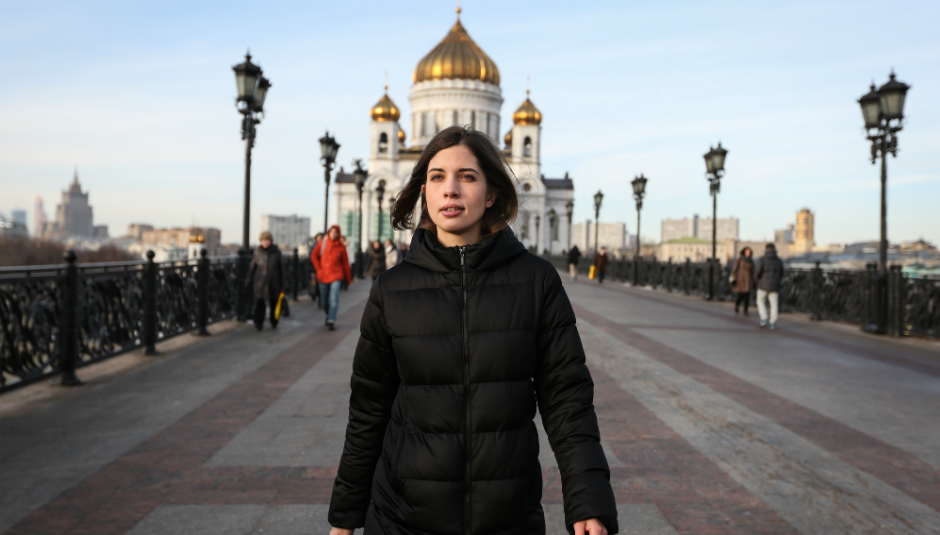In 2012, members of Russian art collective/punk rock band Pussy Riot entered Moscow’s Church of Christ the Savior. They performed a piece called ‘Mother of the Lord, Drive Putin Out’ (the whole event was known as “Punk Prayer”), which addresses manipulation and oppression by the Russian government. Their song did not condemn the Russian Orthodox Church as a religion so much as the way then-Prime Minister Vladimir Putin used the church as a tool of the state. (A translation and explication of the lyrics can be found here.) The band also called out state corruption and Russia’s anti-gay policies.
Three members of the band, Nadezhda Tolokonnikova, Maria Alyokhina, and Yekaterina Samutsevich were arrested and charged with “hooliganism motivated by religious hatred.” Though some in Russia felt that their religion had been slighted, Pussy Riot found huge support in the west, especially from Amnesty International. Despite such international assistance, Tolokonnikova and Alyokhina were convicted. The judge read the details of the verdict for nearly three hours. It charged that the women had “violated laws conceivable and inconceivable” and diagnosed them with “mixed-personality disorder,” a condition characterized by “a proactive approach to life.” Samutsevich received a suspended sentence on appeal, but the other two members were sent to prison colonies.
While Tolokonnikova was incarcerated, she went on a hunger strike to protest prison conditions. Through her lawyer, she published a grim account about prison life that can’t help but invite a profound sense of horror. After publishing the piece, she was sent to solitary confinement for her own protection as she was getting death threats. Now that she’s been released, she works hard on prison reform and founded an organization called Zona Prava (Zone of Justice) that seeks to combat abuse of inmates.
Now Tolokonnikova is making her prison experience real in a whole new way. She has been working with the London-based theatrical group Les Enfants Terribles to create an immersive theatrical experience, Inside Pussy Riot.. The play will run for six weeks in London starting this November. Tolokonnikova will be acting in some performances. She is also running a Kickstarter to raise the money to produce Inside Pussy Riot. You can read more about the project and donate here.
We spoke with Tolokonnikova about the immersive theatrical experience, her prison reform work, and if she would do it all again.
DiS: I've been reading about your immersive theatre experience coming up, and I made a donation to your Kickstarter last night. How far along are you with putting everything together for the play?
Nadya Tolokonnikova: We are working on the venue right now. We're still deciding between several. We will realize a lot of things when we have an actual venue. So that's the first thing. And the second thing, we thought about rooms. We have a presentation for ourselves just to understand what the rooms are going to look like and we have some pictures. I believe at the end it will look pretty different from what we are envisioning right now because of space. Right now I can tell you that it will be the church, our conversation with the priest, and I want to give a glimpse into our super religious society when actual priests are deciding for women what they can do with their bodies and who can say “vagina” and when and if you have a right to have an abortion or not. Because what the Russian Orthodox church wants, they want to decide for women, they want us to have an abortion just if we're raped. But then we have to prove to them that we were raped and they'll say: “Oh, no, it wasn't rape. It was your fault! You were wearing too-short a skirt and therefore it wasn't rape. You provoked it.” It's endless. It's endless bullshit.
Anyway, we'll start from this kind of conversation. We want to give the members of the audience an understanding of what makes us act, and then they will join us in our action, in masks, in the church, the cathedral, 'Punk Prayer,' and everything that happened after. None of it is pleasant, but it's important for an audience to go through, to prepare themselves to live through an authoritarian society. Because I believe if you don't want to fight for your rights, they will be taken away and you will end up in an authoritarian society even if you believe it's a free country; the erosion of institutions is real. I'm looking at America now, and I don't understand what the fuck is going on.
Neither do we.
People lose trust in politics. It's not like Donald Trump will go away and it will be gone. It will not. People hate politics. People hate politicians. They hate the whole discourse. It'll be a trauma for one generation, maybe two generations. So it's a real erosion of the whole notion of democracy. Broader, the big statement is that we're trying to do this play to take it back. You need to put real meaning, and what does democracy mean? What does it mean to fight for your freedoms and rights?
Do you think Inside Pussy Riot will be performed in other countries as well?
I hope so. It all comes down to if we're able to make it interesting for people, if they want us to bring it. I believe in people's power. If people want to bring it, they will do it. I obviously want to bring it to other countries. Ultimately, I would want to do it in Russia! (laughs) After Putin is gone, I want to take it to the FSB building in the center of Moscow. They tortured so many people there and I want to make a museum, a play which is dedicated to all the victims of FSB and KGB in the past. They tortured so many people there and I want to make a museum, a play which is dedicated to all victims of KGB in the past.
Do you keep in touch with anyone you met when you were in prison?
Yeah, we're in touch with a bunch of people and when we have this opportunity I'm in touch with them directly, and sometimes I call the prison. Sometimes it's impossible. There are official phone calls, so it doesn't mean you're violating the law if you call the prison. The prison administration doesn't really like when I call because they know I'm an advocate for prison reform. We have lawyers all over Russia, they’re messing with the prison officials, and they’re helping prisoners to file papers for the European Court of Human Rights. At this point, we have three dozen cases in the European Courts of Human Rights; like Russian prisoners against Russian penitentiary systems. Sometimes we need to be in touch with prisoners through lawyers. And so people with whom I spent time there, they're in freedom too, and we're just in touch through social networks.
You published that really brutal letter about the conditions at Penal Colony 14 and why you were going on a hunger strike. Has anything changed at that facility?
The trickiest thing about prison reform, the unfortunate thing, it has to come with the will of the government. It is possible to change things individually. It's possible to help one person or two people by providing them with lawyers and media support. But unfortunately, the truth in our terrible cruel penitentiary system is that in general, it hasn’t really changed since gulag times. In order to break the system, you need to implement a lot of changes from the very top, using the will of the President. Obviously, our President is not interested in that. If you take a look at the facility where I started my hunger strike, things changed for one month, but then I was moved to a different prison in Siberia. I was moved from central Russia to Siberia, so in my previous penitentiary, they were able to go back to 16-hour work days and no days off. In order to achieve legal changes, we need to attack them all the time. That's why we made a prisoners' rights organization; it's called Zone of Justice. Every time our lawyer comes to sue, and files complaints, for a week after that, conditions may improve. But then he leaves the town and everything's the same. We really need to go there as workhorses and have a big stick and put this stick on the heads of prison officials. Literally. This ongoing process, it's like you're an ant and you're trying to fight with a human being. It's hard, but it's doable. Even an ant can bite, and it's not really pleasurable for a human being.
When you were released, how did you feel that your incarceration had changed you?
In my work, you try not to think about bad influences, so they're just not present for you. At least my mind works in this way. But I can see how it helped me. In a way, it helped me to focus, to concentrate, to be present more in the moment. When you're facing seven years in jail and sitting in solitary detention in one cell for six months, and if you are spending time with the same people every day, you learn how to love, literally. It's not just big words. It's something that I went through emotionally. I really learned how to love a drop of rain or a green leaf you are able to see. Because you are not able to see green leaves in summer in the penitentiary. So you learn the importance of small moments, so when I get out of prison, I will live in the same way. Fyodor Dostoevsky wrote about it – Dostoevsky was convicted to a death sentence, and five minutes before his death sentence, he got news that he would just remain incarcerated. He made a promise to himself that he would lead a meaningful life because it's a gift. And that's what I did. Everybody knows this anyway; they just start to behave like an asshole when they're in prison. They don't notice the clouds. They don't notice the sun. And you have to remind yourself all this can be taken away from you, easily. And coming back to our show, our immersive theatre, that's part of what I want to show to people, that they will get out of this gloomy atmosphere in jail and they will be able to understand how fucking brilliant is the day you can move freely around. I want people to understand that their freedom is not a given thing. It is a gift, it is a miracle, and it is something you need to cherish and stand for.
A lot of the things that you endured in prison were really physical things like fatigue and hunger and thirst and solitude. I imagine those things are a bit harder to translate in a theatrical experience. How are you approaching those?
I was thinking about it a lot. At first, I was really sad that you can’t create it in people, then I was like: “Oh, I need something that people don't really need to go through.” I came to the conclusion that if somebody can skip this part of my experience, I'll be happy.
You've been working with Les Enfants Terrible to stage your immersive theatre experience. What is that collaboration like? Do you give them ideas and descriptions and have them go from there, or is it 50/50?
My role here is to tell my story. We were political activists who were incarcerated in Russia right now in this particular production. It will be a prerogative of Les Enfants Terribles to understand how they will implement it in the form of immersive theatre. I want to take a look at how they will work with it because I know it's not my last experience of immersive theatre, so I want to learn from professionals how they do it. And later, maybe, I will be more involved in the set design. For now I work mostly as a source of information about the political situation in Russia, incarceration in Russian prisons. And not just in Russia. I want to generalize here a little bit and say we need to reform our prison system on a global level. Because when I think about American prisons, the prison industrial complex in America is really sad, and it's getting even worse because of Donald Trump; all these private prison facilities are really happy, and their actions are raising their value on the Stock Exchange. I want to generalize here a bit because we are travelling a lot and speaking with activists all around and we're speaking with activists in Singapore and Australia and America. That will be my role in this production, to try to raise awareness about that. When it comes to creating characters and set design, it will be done by Les Enfants Terribles.
When you did your performance at the Cathedral of Christ the Savior, did you have any idea that it could result in such serious repercussions as trial and imprisonment? And would you have still done it if you knew that?
You can't predict when you will end up in jail when you're an activist in Russia, but you always have to face this chance. If you're making political art or if you're making political work in Russia and you don't think you may end up in prison, you're an idiot. So we always knew that there was a risk but you never know. Because our government is highly unpredictable, pretty much as Trump's government. You don't know what kind of shit they will do tomorrow. When we came to the church, we didn't know we'd end up in jail because of that. We didn't violate any law. I doubt that what we did was something that could be qualified as a misdemeanour, given that we didn't make a criminal act. But, as you know, at some point our Arch Patriarch called Putin and was like: “I'm irritated. Let's put them in jail.” Would do it again? I don't know. You never have this option to take a look at your future, so I don't know. If God will call me and say that we will go to jail because of this action, I probably would do it anyway.
For more information about Inside Pussy Riot, and to donate to their Kickstarter fund, please click here.
Photo Credit: Denis Sinyakov























